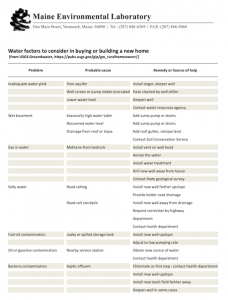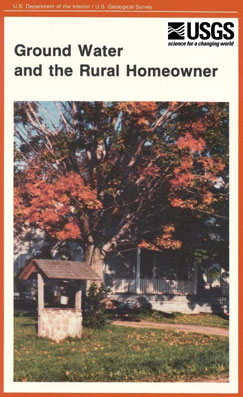Routine Testing Recommended by the State of Maine
Well-water needs to be tested periodically to ensure its continued potability. The State of Maine recommends the following schedule of testing in its "Uniform Testing Recommendation".
Also visit the State of Maine "Private Well Water and Testing" webpage.
| How Often | State of Maine Recommendation (2017) |
|---|---|
| Annual | Nitrate Nitrite Bacteria |
| Every 3-5 Years | |
| Every 3-5 Years Radiological Analysis | |
| Source of Data | Maine Statute §2660-T, “Safe Drinking Water from Residential Private Wells: Uniform Testing Recommendation” (2017) |
Other contaminants of concern:
Per- and Polyfluoroalkyl Substances (PFAS)
PFAS have been found in a significant percentage of private wells in Maine and New Hampshire.
In 2021, the State of Maine introduced a mandate for all Public Water Systems to test for PFAS contamination in their wells. (source: Testing for PFAS in Public Drinking Water Systems). The State of New Hampshire recommends private home wells be tested for PFAS every 3-5 years.
Please visit our PFAS page for more information.
Volatile Organic Compounds (VOCs)
The most common VOCs come from gasoline compounds (such as MtBE and benzene) and industrial solvents. MtBE can be found in well water even in remote areas. The State of New Hampshire recommends testing for VOCs every 3-5 years.
Pesticides and Herbicides
Most states do not routinely recommend testing for pesticides and herbicides because it's expensive. However, such testing might be warranted if your water has elevated nitrite/nitrate concentrations or if significant amounts of pesticide have been applied near the well.
Source: NHDES "Suggested Water Quality Testing for Private Wells" (3 pg. pdf, 2020)
Specific Well Water Concerns
Stinky water? Staining? The funky well upta camp?
From the EPA's "Protect Your Home's Water" (website):
| Conditions or Nearby Activities: | Test for: |
|---|---|
| Recurring gastro-intestinal illness | Coliform bacteria |
| Household plumbing contains lead | pH, lead, copper |
| Radon in indoor air or region is radon rich | Radon |
| Corrosion of pipes, plumbing | Corrosion, pH, lead |
| Nearby areas of intensive agriculture | Nitrate, pesticides, coliform bacteria |
| Coal or other mining operations nearby | Metals, pH, corrosion |
| Gas drilling operations nearby | Chloride, sodium, barium, strontium |
| Dump, junkyard, landfill, factory, gas station or dry-cleaning operation nearby | Volatile organic compounds, total dissolved solids, pH, sulfate, chloride, metals |
| Odor of gasoline or fuel oil, and near gas station or buried fuel tanks | Volatile organic compounds |
| Objectionable taste or smell | Hydrogen sulfide, corrosion, metals, bacteria |
| Stained plumbing fixtures, laundry | Iron, copper, manganese |
| Salty taste and seawater, or a heavily salted roadway nearby* | Chloride, total dissolved solids, sodium |
| Scaly residues, soaps don’t lather* | Hardness |
| Rapid wear of water treatment equipment* | pH, corrosion |
| Water softener needed to treat hardness* | Manganese, iron |
| Water appears cloudy, frothy or colored* | Color, detergents |
*This is a "nuisance concern" and not necessarily an immediate health threat. Still, these issues are good to address for aesthetic reasons and to prolong the life of your pipes and/or equipment.
Handout: Common Rural Well Problems and Some Solutions
aka "Water factors to consider in buying or building a new home"
(from the excellent USGS website Groundwater and the Rural Homewoner)
Tests for Home Businesses and More
The State of Maine requires some small businesses to do annual "Basic Safety" tests on their water if they get their drinking water from surface water or private wells.
The Basic Safety Test list:
| Test | Result Must Be |
| Coliform Bacteria | Absent |
| Nitrate | Less than 10 mg/L |
| Nitrite | Less than 1.0 mg/L |
Maine Child Care Facility and Provider Licensing Well-Water Testing (2021)
| Initial | Annual | Every 5 Years |
| Coliform Bacteria | Coliform Bacteria | Fluoride |
| Nitrate and Nitrite | Nitrate and Nitrite | Arsenic |
| Fluoride | Lead - "First-Draw" | |
| Arsenic | Uranium | |
| Lead - "First-Draw" | ||
| Uranium |
10-148 CMR Ch 33, Family Child Care Provider Licensing Rule (5/27/21)


